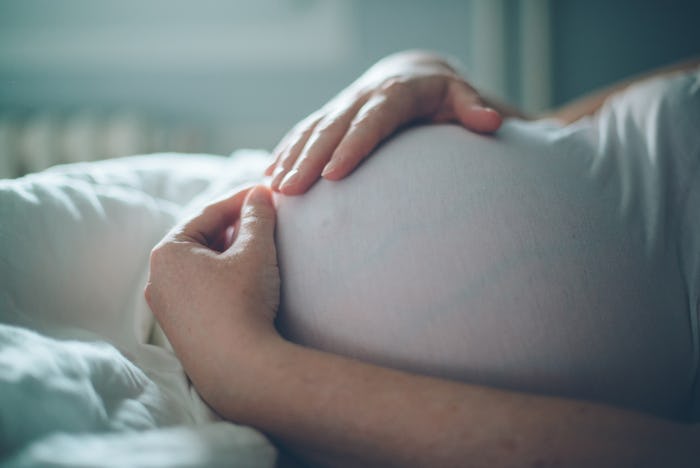Life
The Air You’re Breathing While Pregnant Could Affect Your Baby’s Blood Pressure, Study Finds
A new study claims women who breathe polluted air while pregnant may be more likely to have kids with a pretty significant health issue. The study found that the air you're breathing during pregnancy could affect your baby's blood pressure. In the study, children with the highest exposure to fine particulate matter — defined by Reuters as "PM 2.5, a mixture of solid particles and liquid droplets smaller than 2.5 micrometers in diameter that’s found in traffic exhaust and can include dust, dirt, soot, and smoke" — were 61 percent more likely to have high blood pressure than kids with the lowest exposure. That's kind of a scary statistic, but let's dig a little deeper.
Researchers analyzed nearly 1,300 mothers and their babies from the Boston area for the study, according to CBS. They accounted for circumstances that can influence child blood pressure, like birth weight and whether the mother smoked, according to U.S. News & World Report. And they measured the children's blood pressure at doctor's appointments from the ages of 3 to 9.
Researchers sorted the kids into three groups — from highest to lowest levels of exposure to PM 2.5 in the womb — and that's how they determined that children in the highest-exposure group were more likely to have high blood pressure, according to Reuters. The study noted that that exposure to ambient PM 2.5 during the third trimester of pregnancy specifically appears to be associated with elevated blood pressure in kids.
Study author Dr. Noel Mueller, of the Johns Hopkins Bloomberg School of Public Health, told CBS News:
What we found was that air pollution exposure during the third trimester in particular was associated with higher blood pressure in children.
And Mueller added:
We know that blood pressure tracks through life. Children who have elevated blood pressure in childhood have a higher probability of having hypertension later in life and cardiovascular diseases.
And that's one of the main issues here. High blood pressure isn't an isolated health concern. The American Heart Association reported that when high blood pressure is left uncontrolled or undetected, it can lead to:
- Heart attack
- Stroke
- Heart failure
- Kidney disease or failure
- Vision loss
- Sexual dysfunction
- Angina
- Peripheral artery disease (PAD)
Which are all pretty serious health problems.
There are a few catches to the study's findings, however. For example, the study was not a controlled experiment meant to prove whether air pollution exposure in the womb might directly cause high blood pressure, or how it can, according to Reuters. Researchers also didn't have data on how much time women spent breathing polluted air outdoors or taking in any exposure to PM 2.5 at work.
As with many studies, more research is definitely needed on this particular topic, especially because this study established an association between air pollution exposure and high blood pressure in kids, but it did not prove a direct cause-and-effect relationship, ScienceDaily noted. Mueller touched on the fact that this is all new to researchers as well when he said, according to ScienceDaily:
Ours is one of the first studies to show breathing polluted air during pregnancy may have a direct negative influence on the cardiovascular health of the offspring during childhood.
And Dr. Xiaobin Wang, a pediatrician and director of the Center on Early Life Origins of Disease at Johns Hopkins University Bloomberg School of Public Health in Baltimore, said, according to American Heart Association news:
Future studies are needed to confirm our findings, but it is safe to say that women during pregnancy should try to avoid exposure to air pollution.
The solution to the problem is not as simple as "just stay away from pollution!" for many moms. And the problem may affect some populations more than others. Dr. Diane Gold, a pulmonologist and professor of medicine, noted that the dangers of air pollution may be worse for pregnant people in lower socioeconomic classes, according to U.S. News & World Report. She said:
Exposures to pollution may be higher in disadvantaged communities, and may ultimately contribute to health disparities.
Researchers know that pregnant people can't just pack up and leave if they live in a heavily polluted area. But Mueller did suggest that pregnant women "consider avoiding highly polluted areas during pregnancy" if they can, according to Reuters. He also said the government needs to step in and take further steps to fight pollution, according to CBS:
We need regulations to keep our air clean, not only for the health of our planet but also for the health of our children.
Because the truth is, people can do small things to try to combat pollution, like carpool or ride bikes or recycle more, but it takes major change on a societal level to truly deal with the problem. As we learn more about how pollution can hurt kids, even before they're born, some of President Donald Trump's proposed environmental policies — like rolling back auto-emissions standards and undoing standards for sources of air pollution under the Clean Air Act — seem even more dangerous.
